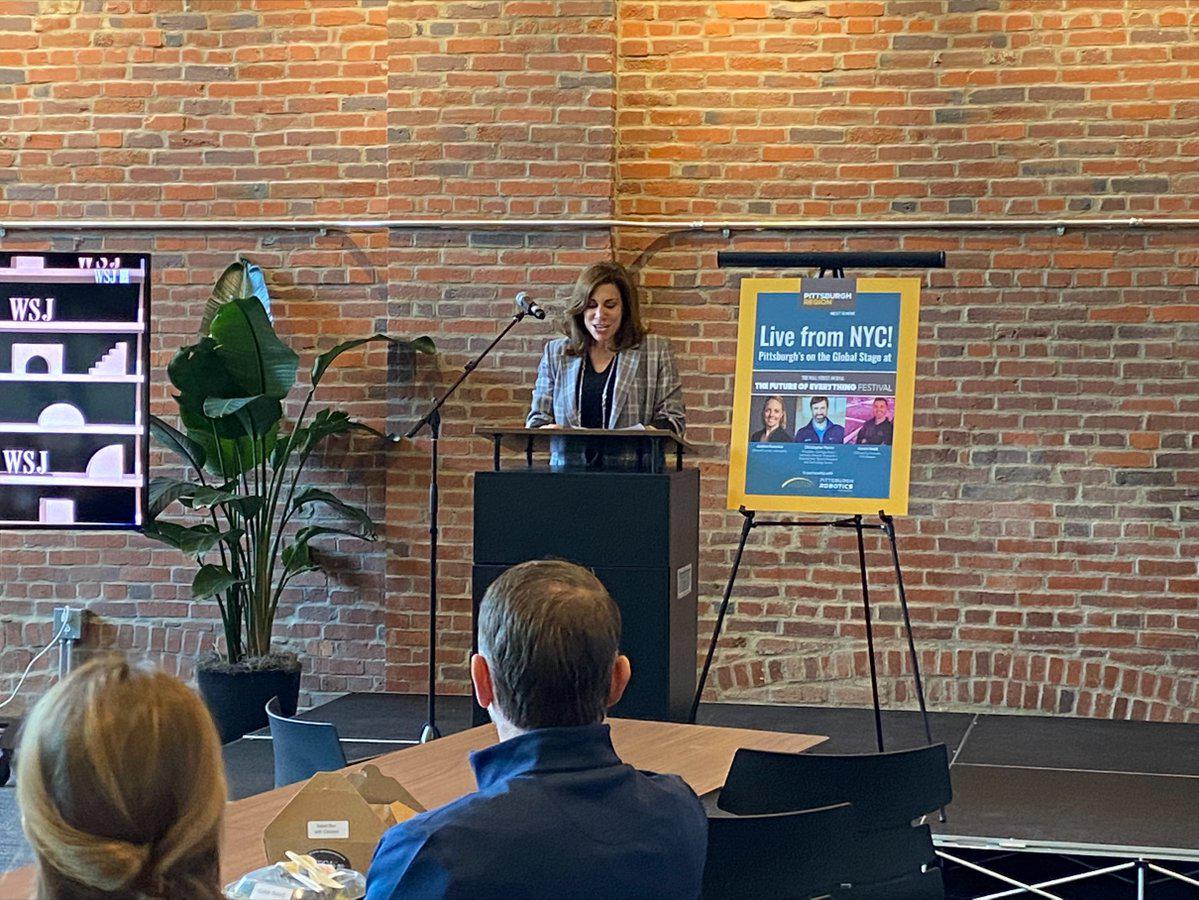What comes to mind for Pittsburgh technologists when asked about the future of everything? Surprisingly, it’s space.
This week, the Wall Street Journal hosted its annual Future of Everything Festival, the first after a two-year hiatus due to the pandemic. A hybrid three-day conference, the festival brought together technologists, entrepreneurs, creators and more from almost every industry to discuss what ideas and trends are shaping the future.
One panel on Wednesday, sponsored by the Pittsburg Regional Alliance, was a discussion on tech and accessibility between three prominent voices in local tech: Fifth Season CEO and cofounder Austin Webb, Carnegie Bosch Institute President Christopher Martin and Astrobotic General Counsel Justine Kasznica.
Hosted by WSJ’s Director of Emerging Tech and Innovation Elena Corchero, the half-hour panel focused on how each of these innovators are thinking ahead to ensure the benefits of their tech reach everyone. But another running theme of the conversation was that Pittsburgh’s is, “giving Silicon Valley a run for its money,” Corchero said at the conclusion of the event.
Those interested in hearing the full conversation can find a recording of the livestream here. But in the meantime, we offer three main takeaways from the Pittsburgh innovators.
Space is the place
Despite only one of the three panelists representing a company specifically focused on space, advances in the field became the center of the discussion thanks to existing partnerships between 2007-founded space tech firm Astrobotic, Bosch’s Research and Technology Center in Pittsburgh (of which Martin is also the director) and Carnegie Mellon University. All three organizations have worked together for a number of years now, leveraging Astrobotic’s capabilities of bringing technology to space to investigate new applications of computer science, robotics and AI there.
Advertisement
“We’re good at a lot of stuff, but what we’re not good at is figuring out how to get to space,” Martin said in response to a question of why Bosch got involved with Astrobotic to begin with.

The two worked together to bring Bosch’s AI-driven audio technology, SoundSee, to the International Space Station where it now uses a custom array of microphones and machine learning to detect potential problems in the machinery based on the sounds emitted in the environment.
“We never would have been able to get this thing to the space station without our friends at Astrobotic, because they had, at that point, probably at least a decade in knowing how to work in that domain,” Martin said.
He added that he expects to see more partnerships made by companies leading innovation in AI, computer science and other technical areas with others looking to bring that tech to new specific domains, whether it be space, healthcare or others.
Even Webb, who leads a vertical farming company powered by robotics, added that space is on the radar for Fifth Season as well. True controlled environment agriculture, something the company is trying to achieve, means it could be possible to grow plants anywhere on Earth and beyond. So while there aren’t concrete plans to break into that field for Fifth Season at the moment, Webb underscored that it’s something on the company’s mind to consider down the road.
Innovation is expensive, but that shouldn’t be a barrier to entry
The recent phenomenon of billionaires like Jeff Bezos launching trips to space simply because they can also entered the discussion.
“We’re coming off a year where we have billionaires flaunting their recent space flight activity, and it’s very clear that space, being as inaccessible as it is, is very much a billionaire’s kind of play land,” Kasznica said. “At Astrobotic, our motto is making space accessible to the world, and we do that in a number of ways.”
She pointed to the space tech firm’s business model, which capitalizes on the decreasing costs of getting to space by offering delivery payloads to companies, governments, universities and nonprofits. In doing so, Astrobotic tries to create more opportunity for people who might not otherwise have a path to accessing space. Kasznica mentioned that the company is working with the Mexican Space Agency and Nepal to deliver payloads, giving them each their “Apollo moment.”
Kasznica also underscored the outreach efforts Astrobotic focuses on to encourage youth and other potential employees to enter the space tech industry as well. She pointed to estimates that it will reach a $1 trillion market by 2040. The Moonshot Museum, slated to open in Pittsburgh this October, will provide a hands-on look at the kind of work Astrobotic does to engage youth while the Keystone Space Collaborative focuses on workforce development today.
Excitement around space doesn’t take away from needs here
Despite all of three panelists pointing to space as an undeniable place for future tech innovation, they also underscored that there are needs for similar commitments to innovation here on Earth. Martin, who is on the Museum Advisory Board for the Carnegie Science Center on the North Side, shared that the center came up against some difficult questions from the local community as it prepares to open a new space-themed exhibit.
“A lot of questions came back that maybe we should’ve expected, but didn’t,” Martin said. “Like, why are we going to space when it kind of sucks down here a little bit? We’re just going to screw it up up there.”
Those responses came from grade school-age kids, and “really changed the conversation,” he said.
Webb echoed that sentiment, mentioning Fifth Season’s goal of achieving true controlled environment agriculture. While that would likely mean the company’s tech is feasible in space, it also means it could work anywhere on Earth, where there are urgent hunger and agriculture crises, especially with the growing threat of climate change. Ensuring access exists here is a priority over space innovations in agricultural tech for now, he said.
Sophie Burkholder is a 2021-2022 corps member for Report for America, an initiative of The Groundtruth Project that pairs young journalists with local newsrooms. This position is supported by the Heinz Endowments. Companies: Fifth Season, The Bosch Group, Astrobotic -30-




